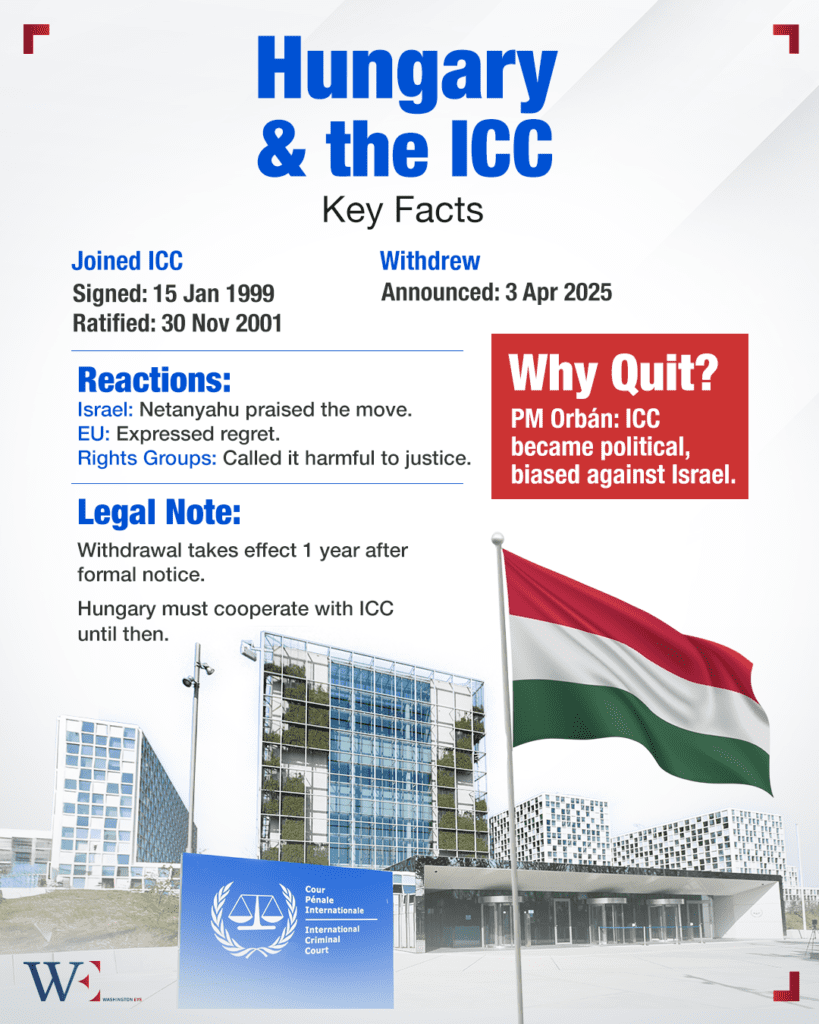In a move that has sent ripples through international legal and diplomatic circles, Hungary has announced its intention to withdraw from the International Criminal Court (ICC) on April 3, 2025. This decision was unveiled during the official visit of Israeli Prime Minister Benjamin Netanyahu to Budapest, marking a significant shift in Hungary’s stance toward international judicial institutions.
The catalyst for Hungary’s withdrawal appears to be the ICC’s issuance of an arrest warrant against Israeli Prime Minister Benjamin Netanyahu. The warrant alleges war crimes and crimes against humanity committed during the Gaza conflict. Hungarian Prime Minister Viktor Orbán has been a vocal critic of this action, describing the ICC’s decision as “political” and asserting that the court has overstepped its mandate.
Orbán’s Justification
Prime Minister Orbán articulated his concerns about the ICC’s operations, stating that the court has become increasingly politicized, particularly in its recent decisions regarding Israel. He emphasized that such actions undermine the neutrality and effectiveness of international judicial bodies. Orbán’s stance reflects a broader skepticism toward international institutions that, in his view, infringe upon national sovereignty.
The timing of Hungary’s announcement coincided with Prime Minister Netanyahu’s visit to Budapest, his first European trip since the ICC issued the arrest warrant. Netanyahu praised Hungary’s decision, describing it as a “bold and principled” move against what he termed a “corrupt and politically motivated” institution. This visit underscores the strengthening ties between Hungary and Israel, particularly in the face of international legal challenges.
International and Domestic Responses
Hungary’s decision has elicited a spectrum of reactions both domestically and internationally. The ICC expressed regret over the move, emphasizing that as a founding member, Hungary is obligated to adhere to its commitments under the Rome Statute. International human rights organizations have also voiced concern, warning that this withdrawal could undermine global efforts to ensure accountability for serious international crimes.
Domestically, the decision has sparked debate among political figures and legal experts. Supporters of Orbán argue that the move is a necessary assertion of national sovereignty and a stand against international bodies perceived as biased. Critics, however, contend that withdrawing from the ICC could isolate Hungary diplomatically and weaken its commitment to international justice norms. The process of withdrawing from the ICC involves several steps. Hungary must formally notify the United Nations of its intention, after which there is a one-year waiting period before the withdrawal becomes effective. During this period, Hungary remains obligated to cooperate with the ICC. Legal analysts note that this move could set a precedent for other nations contemplating similar actions, potentially impacting the efficacy and authority of the ICC.
Hungary’s withdrawal from the ICC is emblematic of a broader trend wherein nations reassess their relationships with international institutions. This decision aligns with Hungary’s recent foreign policy trajectory, emphasizing national sovereignty and expressing skepticism toward supranational organizations. The move also reflects the complex dynamics within the European Union, as Hungary becomes the first EU member state to announce such a withdrawal, potentially influencing the bloc’s collective stance on international justice.
Looking ahead, the international community will be closely monitoring the ramifications of Hungary’s decision. Questions arise about the potential for other nations to follow suit and the impact this could have on the global justice system. Additionally, Hungary’s relationships with other EU member states and its role within the union may be affected, especially concerning collaborative efforts on international legal matters. In conclusion, Hungary’s announcement to withdraw from the ICC marks a pivotal moment in international relations, highlighting the tensions between national sovereignty and global judicial accountability. As the situation develops, it will serve as a critical case study in the evolving landscape of international law and diplomacy.















